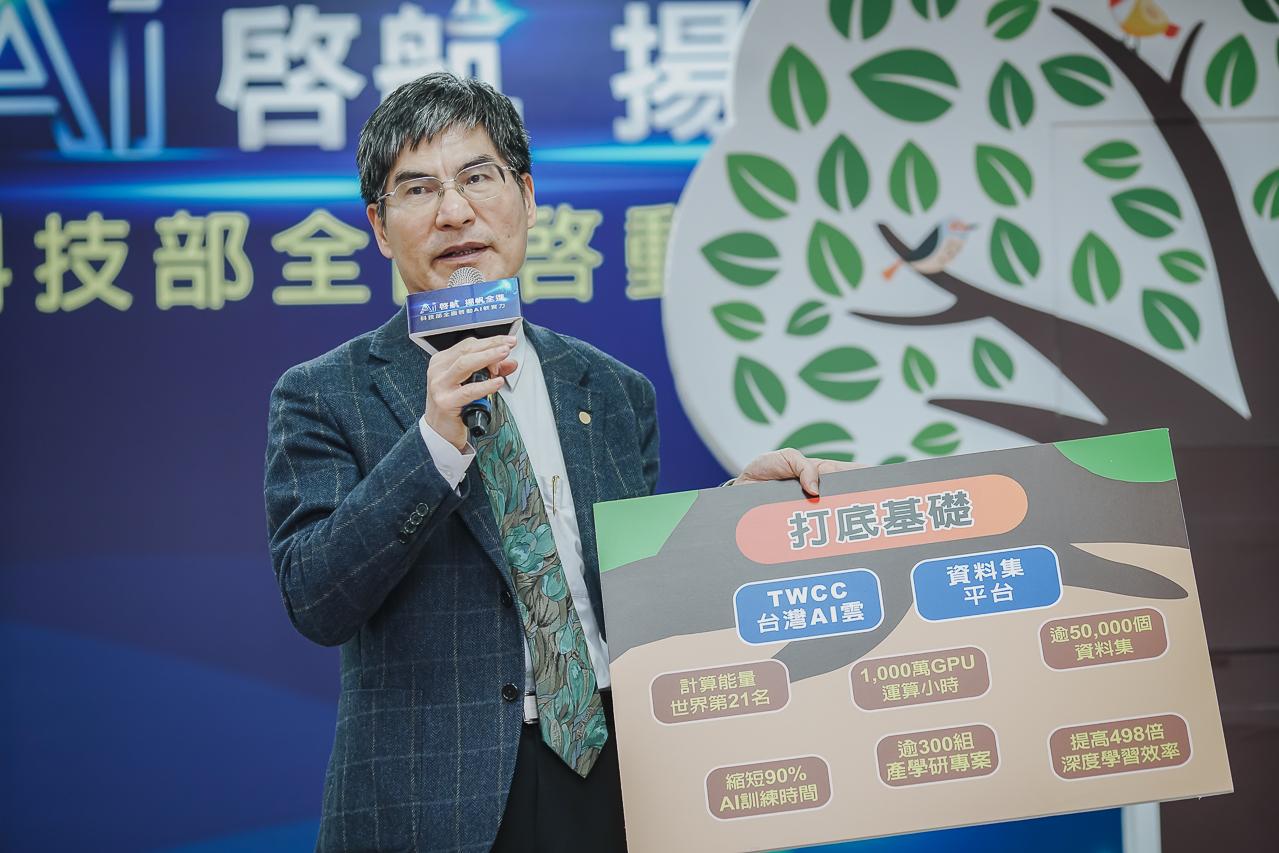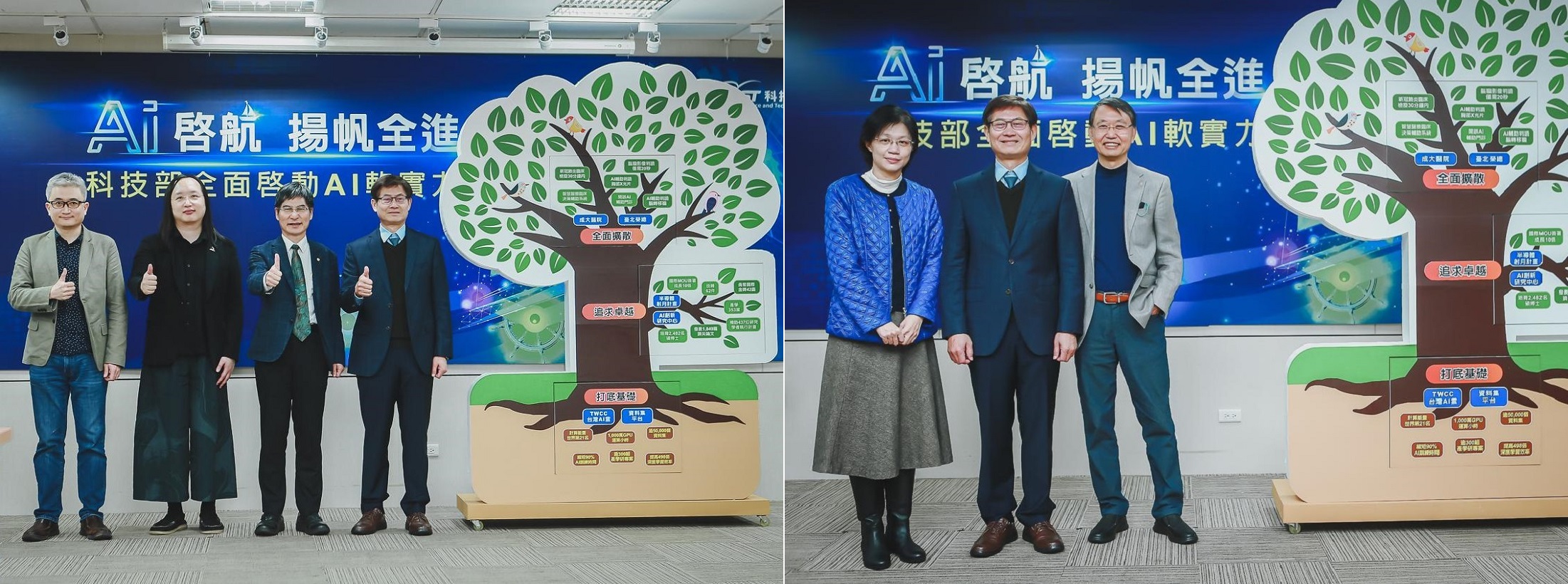AI sets sails, propelling the Ministry of Science and Technology full speed ahead, unleashing the power of AI
The Ministry of Science and Technology, under the leadership of Minister Liang-Gee Chen, announced in 2017 its Artificial Intelligence (AI) scientific research strategy, striving to evolve Taiwan into a heavyweight in AI development and making Taiwan among the first nations that have already announced and made AI their national strategy. The ministry called a press conference today (10th), and it invited Audrey Tang, minister without portfolio for technology at Executive Yuan, and Ethan Tu, founder of Taiwan AI Labs, to jointly examine the field, talent, technology, and benefit in industrial development of the strategy after three years of execution.
Laying the foundation and using computations and databases to fully support AI development.
Taiwania 2, a supercomputer specifically built for AI, was ranked 21st in 2019's TOP500 and 12th in Green 500. Taiwania 2 offers its cloud service through TWCC (Taiwan Computing Cloud), making its huge computational capability available for AI developments. It is capable of AI image training at a rate of 1.76 million images per second. Since the commercialization of Taiwania 2, about 300 projects from industries, academia, and research organizations have utilized it for close to 10 million GPU hours, helping reduce AI training time by 90% and raise the efficiency of deep learning by 498 fold, clearly showing the significant benefit of applying scientific research to commercial purposes.
On the other hand, the data collection platform at the NCHC of NARLabs has collected more than 50,000 datasets, encompassing fields such as governing, scientific research, language, medicine, information security, and so on, to provide value-added services for researchers and industries. Take medical imaging for example. The NCHC has established image databases for significant diseases like coronary heart disease, brain tumors, and lung cancers. These databases have information about 138,000 cases in 19 categories, including 79,000 cases with disease markings for AI training. This data can be made available to academic research organizations upon application, or it can be used collaboratively by groups that build datasets for the execution of public health or academic research.

Minister Chen explains that the TWCC and data collection platform built by the NCHC have strengthened the foundation of the nation's AI policy.
In the pursuit of excellence, we train talent in technological theories to applications.
The education of professional talent is the foundation of a society. The Ministry of Science and Technology has collaborated with many domestic businesses, such as Taiwan Semiconductor Manufacturing Company, ASE Technology Holding Co., Ltd., and Hon Hai Precision Industry Co., Ltd., on 353 projects. It has trained 2,482 young talents with master's or doctoral degrees in AI, chip design, and professional applications. They can join the ranks of chip designers and AI applications designers.
The Ministry of Science and Technology has actively invited international heavyweight AI scholars to Taiwan for exchanges. It has also encouraged domestic scholars to take part in international AI-related conferences and academic activities. It has published the world's first ever AI R&D guide to raise the influence that Taiwan may exert on the international AI academic circles. Technological breakthroughs and applications have been impressive in the last three years during which it had sponsored 1,849 manuscripts that were published in top domestic or international journals like Nature, IEEE, and AAAI. They have been cited 1,437 times. It has also excelled in 42 international competitions on facial recognition image processing, NVIDIA robot development, and AUDI innovation competition.
To make Taiwan a training hub for AI talents in Asia, the Ministry of Science and Technology has formed international alliances to join hands with top international research organizations, and it has invited international scholars to teach in Taiwan. The courses are open to students from countries in Asia and elsewhere. This curriculum can not only help the students get up to speed on leading AI technologies but also facilitate exchanges of talents and international networking.

(left, from left) Ethan Tu, founder of Taiwan AI Labs, Minister Audrey Tang, Minister Liang-Gee Chen, Deputy Minister Yu-Chin Hsu of the Ministry of Science and Technology. (right, from left) Director General Hsiu-Ya Yang of the Department of Foresight and Innovation Policies and Deputy Minister Yu-Chin Hsu of the Ministry of Science and Technology and Shepherd Shi, Director-General of the National Center for High-performance Computing.
Make the end as beginning, and let innovation spawn the value.
Built on the theme of "a small nation with a great strategy", Taiwan's AI strategy focuses on these five different policies in order to create an innovative AI ecosystem: Using an AI cloud computing platform to improve the foundational environment for AI R&D in Taiwan, using an AI Innovation Research Center to focus our energy so as to form a world class AI R&D cluster, using the AI chip Moonshot Project to break through key semiconductor technologies and aggressively train top talents for semiconductor manufacturing and chip design, using an Innovative AI Robot Maker Space to thoroughly execute the hardware and software integration of robots and deliver innovative applications, and using the Formosa Grand Challenge to entice the broad participation of ordinary citizens and attract their attention to significant AI topic and their challenge to technological breakthroughs.
Our AI R&D platform, built through these five major policies, will continue to speed up the deployment of core technologies and allow them to take root and improve the quality and quantity of our talents and to stimulate innovative solutions. After three years of implementation, these strategies have begun to bear fruit. In addition to the development of local applications and services, they have also bred the next wave of social transformation and growth.
